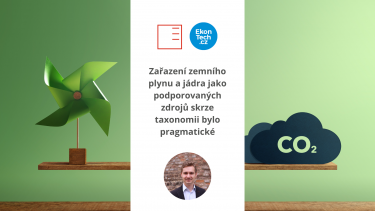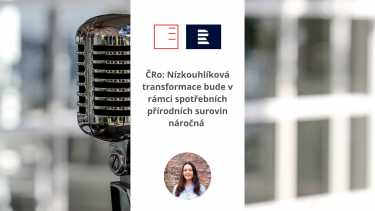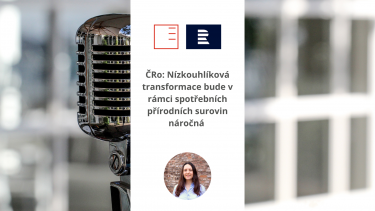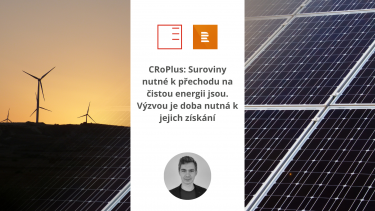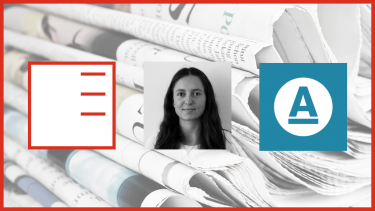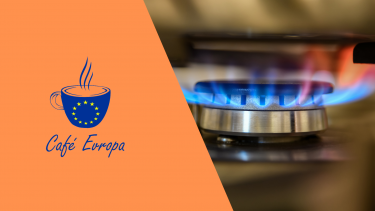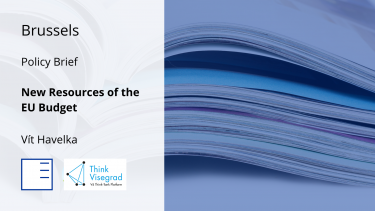EkonTech.cz: The inclusion of natural gas and nuclear as supported resources through the EU taxonomy was pragmatic
Our researcher Michal Hrubý wrote an article on ESG and natural gas for the magazine EkonTech.cz. He comments on the current development of ESG (Environmental, Social, and Governance), including the role of taxonomy and natural gas as a basic commodity for industry and households.
Show moreČRo: Low-carbon transformation will be challenging in the context of consumable natural resources
The European Union will restrict the sale of cars with internal combustion engines by 2035. Our senior researcher Kateřina Davidová commented on Czech Radio about the critical materials for the green transformation.
Show more
CRo: Low-carbon transformation will be challenging in the context of consumable natural resources
The European Union will restrict the sale of cars with internal combustion engines by 2035. Our researcher Kateřina Davidová commented on Czech Radio on the critical materials for the green transformation.
Show moreCRoPlus: The raw materials needed for a clean energy transition exist. The challenge is the time needed to gain them
The transition to clean energy requires sufficient critical resources to enable this transformation. Consumption of these materials is expected to grow significantly in the future. How will the EU's decarbonisation efforts evolve in the future? This topic was discussed by our researcher Michal Hrubý in the Studio Leonardo programme of Český rozhlas Plus. According to Hrubý, the problem is not the lack of resources, but the time it takes to obtain the raw materials. In this context, he draws attention to a new legislative initiative of the European Commission, which aims to better coordinate the time of extraction of critical materials.
Show moreiDnes: Even nuclear energy and gas? Europe faces a key clash over what counts as green
Our Senior Research Fellow Kateřina Davidová commented for iDnes.cz on the EU taxonomy proposal that was rejected last week by two key committees of the European Parliament. They are concerned that nuclear energy and natural gas should be among the sustainable resources.
Show more
E15.cz: The Germans and the Dutch are looking for a replacement for Russian gas wherever possible. They also want to mine in the North Sea area
The newly announced possibility of gas extraction in the North Sea will not solve the current situation. "In the medium and long term, it is only one of many solutions to diversify resources. But the question is whether it will have a significant impact on the European gas market and European independence." However, raw material extraction projects in the EU must be supported.
Show moreDecarbonization of the Czech automotive industry
After the successful delivery of last year’s project focused on the decarbonization of the Czech automotive industry, the climate team of EUROPEUM Institute for European Policy leads its second round. This time, the project aims to use already acquired knowledge, contacts and resources to help create a conducive environment for discussion between the representatives of the industry and the public sector. It will also contribute to our understanding of the decarbonization pathways through evidence-based research. Lastly, the project aims to raise social awareness about the challenges and opportunities presented by the transition of the automotive industry by organizing events and media briefings. This year’s project will be shaped by the Czech Presidency of the European Council in the second half of the year.
Show more

Aktuálně.cz: How to reduce dependence on Russia: Europe and others tackle gas, oil and coal cuts
Our researcher, Kateřina Davidová, commented for Aktuálně.cz on the latest package of sanctions against Russia by the European Union. According to her, the biggest impact on the Russian economy would be the restriction or ban on the purchase of mineral resources from the largest European customers or even from the whole European union. The best alternative to these energies would be to switch to renewable energy sources, says Kateřina Davidová.
Show more
INVITATION: Café Evropa online: The future of European energy - how to ensure stable and clean energy sources without Russia?
We would like to invite you to the Café Evropa debate on 21 March at 17:30 on the topic "The future of European energy - how to ensure stable and clean energy sources without Russia?". The Russian invasion of Ukraine has, among other things, further fuelled the question of energy security in the Czech Republic and the EU and the future of energy in our country. The current security situation points to the need to diversify energy sources as soon as possible, i.e. to secure energy supplies from different regions and countries in order to avoid excessive dependence on Russia. There are also views in the public debate that coal extraction could be temporarily increased, which would enable some countries to cover any shortfalls in resources. Is a complete or even partial halt of Russian gas supplies to the Czech Republic and the European Union a realistic option? What impact would this have on our energy security? How much further increase in energy prices can we expect in this case? How should EU countries react and help households and industry cope with the expected increase? Could a possible temporary increase in coal extraction mean a return to fossil fuels and the end of the EU's climate ambitions? Or could the current problematic situation further accelerate the energy transition?
Show morePolicy Brief: New Resources of the EU Budget
Our researcher Vít Havelka, in his article "New Sources of the EU Budget", which was created under the Think Visegrad in Brussels project, writes about the new own resources of the EU budget, which are currently being discussed at the European level. The text specifically discusses why the reform of own resources is necessary and what are the positions of the various EU institutions and member states on these proposals. It concludes with a reflection on the Czech position, including an outlook on how it might evolve depending on the course of the negotiations.
Show more
Staroměstské náměstí 4/1
Prague 1 - Staré Město
110 00
tel.: +420 212 246 552
email: europeum@europeum.org
https://www.europeum.org
